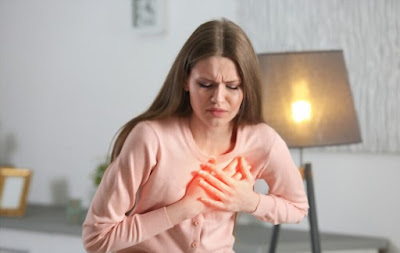Never Ignore These Signs
Unfortunately, there are few clear early warning signs of
cancer, but some can give you advance notice of the presence of cancerous cells
in your body. Look out for these seven common early warning signs of cancer and
talk to your doctor if you notice any of them happening in your own body. Early
detection can mean the difference between successful treatment and serious
health complications later on down the road.
1. Persistent cough or hoarseness
 |
| Image Credit - shutterstock |
Persistent coughing can be a sign of cancer. Coughing might
also be a side effect of cancer treatment and could appear as your body tries
to clear up lung blockages caused by cancer cells. Persistent coughs,
especially if you’re coughing up blood or phlegm, could mean you have one form
of lung cancer (non-small cell) or another illness such as tuberculosis or
pneumonia. If you have trouble breathing when you're lying down, it's likely
due to fluid buildup in your lungs; but if your shortness of breath occurs when
sitting upright or standing, it could be an early warning sign for lung cancer.
A persistent cough that won't go away should never be ignored, talk to your doctor
right away about any concerns.
2. Change in bowel habits
 |
| Image Credit - shutterstock |
If you’ve been noticing that your bowel movements are
particularly smelly, black, or tan or if you’re having more bowel movements
than usual you might have colorectal cancer. It can be difficult to diagnose
cancer at an early stage because there are usually no early symptoms. It’s
important to see a doctor immediately if you notice any changes in your bowel
habits that last for more than a few days. If colorectal cancer is caught early
enough, it can often be treated successfully. The earlier a tumor is diagnosed,
especially when it hasn’t yet metastasized (spread to other parts of your
body), the better chance there is for treatment success.
3. Persistent pain in your chest
 |
| Image Credit - shutterstock |
Persistent chest pain that doesn’t go away may be a sign of an underlying problem. Chest pain can occur in any part of your chest and cause discomfort, pressure, or even a sharp or dull ache. Some common causes include heart disease, acid reflux disease (GERD), lung diseases, inflammatory disorders, and anxiety attacks.
Chest pain is sometimes mistaken for heartburn
because it can feel like you’re experiencing acid reflux. If your chest pains
don’t go away with over-the-counter heartburn remedies after two weeks or if
they are accompanied by other signs such as fatigue, nausea, vomiting, or fever you should see your doctor to rule out underlying conditions such as heart
disease or cancer.
4. Night sweats
 |
| Image Credit - shutterstock |
Everyone sweats at night, but if you're sweating excessively
every night for more than a few weeks, that could be a sign that something is
wrong. Talk to your doctor to rule out thyroid problems or other issues before
you assume it's cancer.
5. New lump or swelling
 |
| Image Credit - shutterstock |
Lumps and swellings are red flags. They can appear anywhere
on your body, but breast lumps or swelling, testicular lumps or swelling,
abdominal lumps and pain, and rectal bleeding are particularly alarming. Lumps
in these places could mean cancer is present. If you notice a lump or swelling
that lasts for more than two weeks, see your doctor for an evaluation.
6. Unexplained weight loss or gain
 |
| Image Credit - shutterstock |
If you have unexplained weight loss or gain, it might be a
warning sign of pancreatic cancer. However, don’t take drastic measures. First, make an appointment with your doctor and bring up your concerns. They’ll
probably recommend additional tests to make sure that there isn’t another
reason for your weight change such as thyroid disease or side effects from
medication. Let your doctor know about any family history of cancer and
schedule regular checkups for early detection. Another warning sign to watch
out for is intestinal issues including diarrhea, constipation, changes in
appetite, abdominal pain or cramping that doesn’t go away within a week.
7. Change in wart growth
 | |
|
It may sound odd, but when a wart appears to change its growth pattern, it could be a sign of cancerous cells present in your skin. If you notice that one of your warts is growing outwards instead of downwards, have it checked out right away; ignoring these changes can result in more serious problems.
It’s also important to watch for other signs if you have a tendency
toward warts the appearance of red streaks on or around them could indicate an
infection caused by bacteria. Warts are considered benign (not cancerous), but
they shouldn’t be ignored because serious problems like infections and skin
cancers can develop from them if left untreated.
 |
| Image Credit - shutterstock |


Comments
Post a Comment